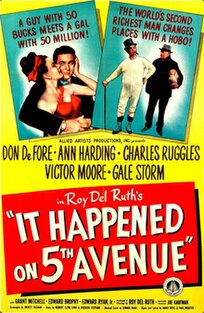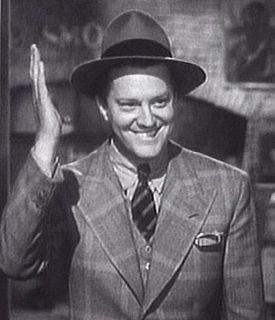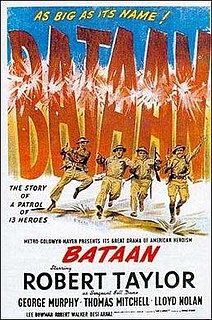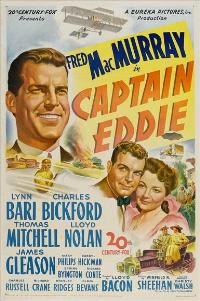
Gertrude Madeline "Trudy" Marshall was an American actress and model.

Somewhere in the Night is a 1946 American film noir psychological thriller film directed and co-written by Joseph L. Mankiewicz and starring John Hodiak and Nancy Guild.

The Underworld Story is a 1950 American film noir crime film directed by Cy Endfield and starring Dan Duryea, Herbert Marshall, Gale Storm, Howard Da Silva and Michael O'Shea. Da Silva plays the loud-mouthed gangster Carl Durham, one of his last roles before becoming blacklisted.

The Left Hand of God is a 1955 American Drama Western film. It was directed by Edward Dmytryk and produced by Buddy Adler, from a screenplay by Alfred Hayes, based on the novel The Left Hand of God, by William Edmund Barrett.

It Happened on 5th Avenue is a 1947 American comedy film directed by Roy Del Ruth and starring Victor Moore, Ann Harding, Don DeFore, Charles Ruggles and Gale Storm. Herbert Clyde Lewis and Frederick Stephani were nominated for the Academy Award for Best Story, losing to Valentine Davies for another Christmas-themed story, Miracle on 34th Street.

Michael O'Shea was known as an American actor who appeared in feature films and later in television and whose career spanned the 1940s, 1950s, and 1960s.

Bataan is a 1943 American black-and-white World War II film drama from Metro-Goldwyn-Mayer, produced by Irving Starr, directed by Tay Garnett, that stars Robert Taylor, George Murphy, Lloyd Nolan, Thomas Mitchell, Desi Arnaz and Robert Walker. It follows the fates of a group of men charged with destroying a bridge during the doomed defense of the Bataan Peninsula by American forces in the Philippines against the invading Japanese.

Stage Door Canteen is a 1943 American World War II film with musical numbers and other entertainment interspersed with dramatic scenes by a largely unknown cast. The film was produced by Sol Lesser's Principal Artists Productions and directed by Frank Borzage. The film features many celebrity cameo appearances but primarily relates a simple drama set in the famed New York City restaurant and nightclub for American and Allied servicemen. Six bands are featured. The score and the original song, "We Mustn't Say Goodbye", were nominated for Academy Awards.

It's in the Bag! is a 1945 comedy film featuring Fred Allen in his only starring film role. The film was released by United Artists at a time when Allen was at the peak of his fame as one of the most popular radio comedians. The film has been preserved by UCLA Film & Television Archive.

The Purple Heart is a 1944 American black-and-white war film, produced by Darryl F. Zanuck, directed by Lewis Milestone, and starring Dana Andrews, Richard Conte, Don "Red" Barry, Sam Levene and Trudy Marshall. Eighteen-year-old Farley Granger had a supporting role.

23 Paces to Baker Street is a 1956 American DeLuxe Color mystery thriller film directed by Henry Hathaway. It was released by 20th Century Fox and filmed in Cinemascope on location in London. The screenplay by Nigel Balchin was based on the 1938 novel Warrant for X, original UK title The Nursemaid Who Disappeared by Philip MacDonald. The film focuses on Philip Hannon, a blind playwright who overhears a partial conversation he believes is related to the planning of a kidnapping. When the authorities fail to take action because they believe his story is the product of a writer's fertile imagination, Hannon searches for the child with the help of his butler and ex-fiancée, using his acute sense of hearing to gather evidence and serve as guidance. The plot of the film bears some resemblance to Alfred Hitchcock's Rear Window of 1954, which also features a disabled protagonist witnessing a crime, which the police refuse to take seriously, therefore placing him in danger and culminating in a final standoff with the killer in the protagonist's darkened apartment.

21 Days is a 1940 British drama film based on the short 1919 play The First and the Last by John Galsworthy. It was directed by Basil Dean and stars Vivien Leigh, Laurence Olivier and Leslie Banks. The film was renamed 21 Days Together for the American market.

Janie is a 1944 film directed by Michael Curtiz based on a 1942 Broadway play by Josephine Bentham and Herschel V. Williams Jr.

Sentimental Journey is a 1946 American drama film directed by Walter Lang and starring John Payne and Maureen O'Hara.

Joe Palooka in the Knockout is a 1947 American comedy film directed by Reginald Le Borg. It was the third part of the Joe Palooka series from Monogram Pictures starring Joe Kirkwood, Jr. as the boxer and Leon Errol as his manager. The film also featured Elyse Knox, Marc Lawrence and Trudy Marshall

Gangs of Chicago is a 1940 film, starring Lloyd Nolan, Barton MacLane, Lola Lane, Ray Middleton, Astrid Allwyn, and Horace McMahon. Alan Ladd has a small uncredited role.

Key Witness is a 1947 American film noir crime film directed by D. Ross Lederman and starring John Beal, Trudy Marshall and Jimmy Lloyd.

Captain Eddie is a 1945 American drama film directed by Lloyd Bacon, based on Seven Were Saved by "Eddie" Rickenbacker and Lt. James Whittaker's We Thought We Heard the Angels Sing. The film stars Fred MacMurray, Lynn Bari and Charles Bickford. Captain Eddie is a "biopic" of Rickenbacker, from his experiences as a flying ace during World War I to his later involvement as a pioneering figure in civil aviation, and his iconic status as a business leader who was often at odds with labour unions and the government.

Pier 13 is a 1940 American mystery film directed by Eugene Forde and starring Lynn Bari, Lloyd Nolan and Joan Valerie. It is a remake of the 1932 film Me and My Gal with Spencer Tracy and Joan Bennett in which a waterfront cop meets an attractive waitress whose sister turns out to be romantically involved with the criminal he is pursuing. The film's sets were designed by the art directors Lewis H. Creber and Richard Day.

The Man Who Talked Too Much is a 1940 American drama film directed by Vincent Sherman and written by Walter DeLeon and Earl Baldwin; it is the second of three films adapted from the 1929 play The Mouthpiece by Frank J. Collins. Starring George Brent, Virginia Bruce, Brenda Marshall, Richard Barthelmess, William Lundigan, George Tobias and John Litel, the film was released by Warner Bros. on July 16, 1940.




















